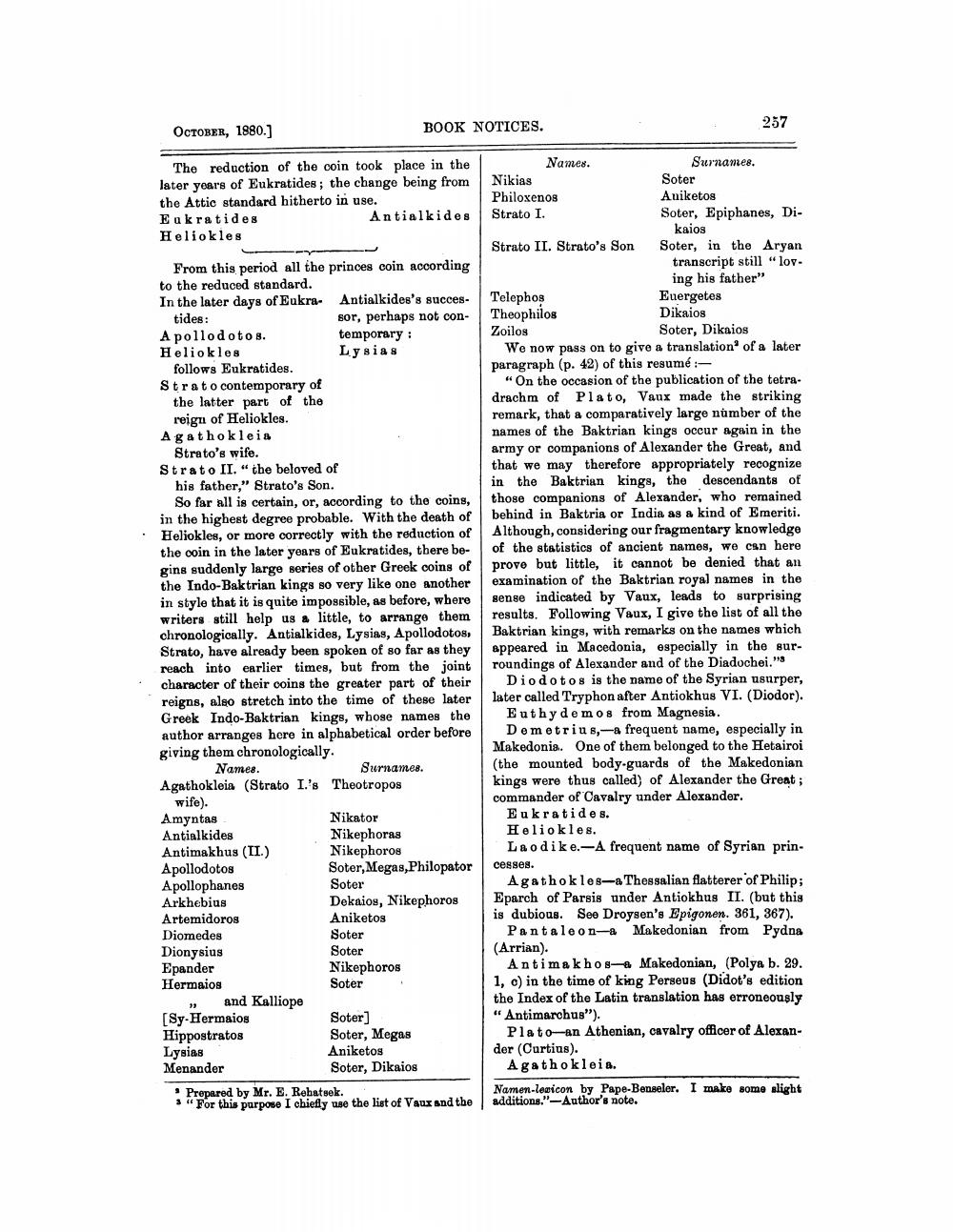________________
OCTOBER, 1880.]
The reduction of the coin took place in the later years of Eukratides; the change being from the Attic standard hitherto in use.
Eukratides
Antialkides
Heliokles
From this period all the princes coin according to the reduced standard.
In the later days of Eukratides:
Apollodotos. Heliokles.
follows Eukratides.
Strato contemporary of the latter part of the reign of Heliokles. Agathokleis
Strato's wife.
Strato II." the beloved of his father," Strato's Son.
So far all is certain, or, according to the coins, in the highest degree probable. With the death of Heliokles, or more correctly with the reduction of the coin in the later years of Eukratides, there begins suddenly large series of other Greek coins of the Indo-Baktrian kings so very like one another in style that it is quite impossible, as before, where writers still help us a little, to arrange them chronologically. Antialkides, Lysias, Apollodotos, Strato, have already been spoken of so far as they reach into earlier times, but from the joint character of their coins the greater part of their reigns, also stretch into the time of these later Greek Indo-Baktrian kings, whose names the author arranges here in alphabetical order before giving them chronologically.
Names.
Surnames. Agathokleia (Strato I.'s Theotropos
wife).
Amyntas Antialkides
Antimakhus (II.)
Apollodotos Apollophanes
Arkhebius
Artemidoros
Diomedes
Dionysius Epander
Hermaios
and Kalliope
[Sy-Hermaios Hippostratos
Antialkides's successor, perhaps not contemporary: Lysias
Lysias
Menander
BOOK NOTICES.
Nikator
Nikephoras Nikephoros
Soter, Megas,Philopator
Soter
Dekaios, Nikephoros Aniketos
Soter
Soter Nikephoros Soter
Soter] Soter, Megas Aniketos
Soter, Dikaios
Prepared by Mr. E. Rehatsek.
3 "For this purpose I chiefly use the list of Vaux and the
Names.
Nikias Philoxenos Strato I.
Strato II. Strato's Son
Telephos Theophilos
Surnames.
257
cesses.
Soter
Aniketos
Soter, Epiphanes, Dikaios
Soter, in the Aryan transcript still "loving his father" Euergetes Dikaios
Soter, Dikaios
Zoilos
We now pass on to give a translation of a later paragraph (p. 42) of this resumé :
"On the occasion of the publication of the tetradrachm of Plato, Vaux made the striking remark, that a comparatively large number of the names of the Baktrian kings occur again in the army or companions of Alexander the Great, and that we may therefore appropriately recognize in the Baktrian kings, the descendants of those companions of Alexander, who remained behind in Baktria or India as a kind of Emeriti. Although, considering our fragmentary knowledge of the statistics of ancient names, we can here prove but little, it cannot be denied that an examination of the Baktrian royal names in the sense indicated by Vaux, leads to surprising results. Following Vaux, I give the list of all the Baktrian kings, with remarks on the names which appeared in Macedonia, especially in the surroundings of Alexander and of the Diadochei."
Diodotos is the name of the Syrian usurper, later called Tryphon after Antiokhus VI. (Diodor). Euthydemos from Magnesia.
Demetrius, a frequent name, especially in Makedonia. One of them belonged to the Hetairoi (the mounted body-guards of the Makedonian kings were thus called) of Alexander the Great; commander of Cavalry under Alexander.
Eukratides.
Heliokles.
Laodike.-A frequent name of Syrian prin
Agathokles-a Thessalian flatterer of Philip; Eparch of Parsis under Antiokhus II. (but this is dubious. See Droysen's Epigonen. 361, 367). Pantaleon-a Makedonian from Pydna
(Arrian).
Antimakhos-a Makedonian, (Polya b. 29. 1, c) in the time of king Perseus (Didot's edition the Index of the Latin translation has erroneously "Antimarchus").
Plato-an Athenian, cavalry officer of Alexander (Curtius).
Agathokleia.
Namen-lexicon by Pape-Benseler. I make some slight additions."-Author's note.




